How to Lead Legal Clients Straight to You: Paid Search
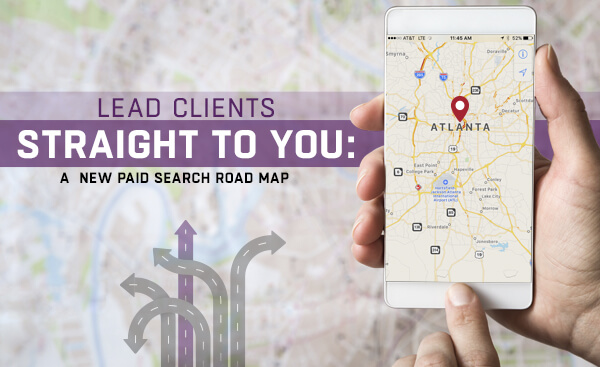
Start Your Firm’s Paid Search Campaign.
Many of the best tools for growing your law firm—TV ads, billboards and a website focused on bringing in cases—can powerfully build your name and client base over time.
But what if you want more clients, and more revenue, right now? We’ve got the answer, as revealed in a recent Firmidable webcast:
Look to paid search.
Pay-per-click (PPC) ads, such as Google Ads, are the most direct way to lead new clients straight to you.
At our legal marketing firm, we hear about the advantages of this approach from lawyers all over the country:
“We are very pleased with the results of the first month’s paid internet advertising,” said Phillip George, an attorney in Tennessee. “Most monthly cases we’ve had in a very long while.”
However, setting up a potent paid search campaign for your law firm requires intense attention to strategy and detail.
We packed our webcast on paid search—presented by Firmidable Senior Account Executive Alex Ludwig—with practical information.
You can view the webcast recording here.
- Why paid search?
- How to build your campaign
- How to optimize your campaign
- Results from successful law firms
What Is Paid Search and Why Does It Work For Law Firms?
Google Ads are the sponsored advertisements that appear above the “organic” results when you search for something online.
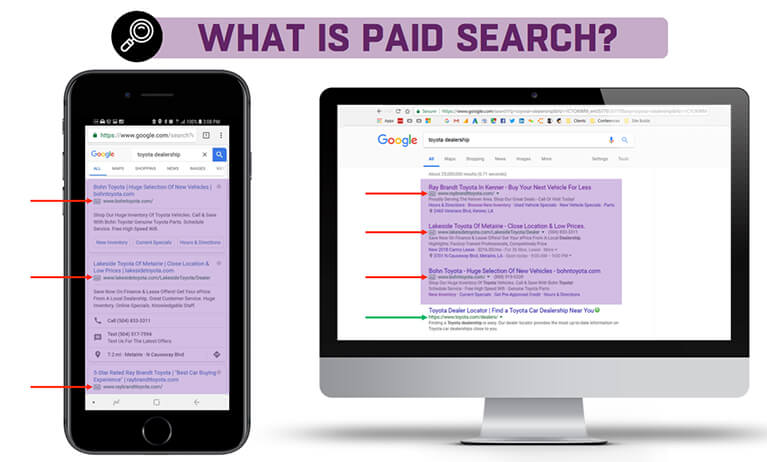
As you can see in the image above, paid search ads take up the most important chunk of real estate on a page of search results. In the mobile example, you wouldn’t even reach the organic search results without scrolling down.
If your law firm isn’t appearing here, you’re missing out on opportunities—particularly in competitive markets.
But why do paid search ads bring in so many more cases so fast. Four reasons explain why:
- They’re relevant.
- They’re flexible.
- They allow you to learn from your competitors.
- They deliver immediate results (when done correctly).
Relevancy: A searcher will click on your ad if they see something specific to their query—in other words, if you show them a solution to their problem.
“If I’m searching for a ‘car wreck lawyer’ or ‘what to do after I’m injured in a car wreck’ and I’m served with an ad for a lawyer that is very relevant to me and my query, there’s a high likelihood that I’m going to interact with that ad,” Alex said in the webcast.
“It’s a misconception that people hate ads. What they hate is ads that aren’t relevant to them.”
Paid search allows you to tie your ads to specific queries, making them relevant to the reader.
Relevancy also means filtering out “bad leads”; that is, clients who aren’t relevant to you.
Flexibility: Paid search can work as a standalone tactic or in concert with other parts of a multi-channel legal marketing strategy.
Competition: Paid search lets you look at firms running PPC campaigns in your area, gauge what they’re doing right or wrong, and learn from them.
Immediacy: PPC campaigns can generate calls and e-mails from day one. Other tools, like search engine optimization (SEO) for your website, are great for building your brand and authority over the long term but can take time to start attracting new cases.
Special Note: What about Buying Leads?
Some law firms buy leads from companies that run generic paid search campaigns and then pass the potential clients to the firms.
Why not do this instead of running your own paid search campaigns?
You should avoid buying leads for many reasons:
- People who see those ads don’t see your name. You’ll get clients who don’t know who they’re calling.
- You don’t control the message people see or how relevant it is, potentially turning off clients and sending you low-quality leads.
- You don’t control the path clients take to you, so you’re not building the kind of familiarity that leads them to retain you in the end.
“We can remove some friction (in the client’s process of choosing a lawyer) if you’re owning the whole process,” Alex said.
How to Build Your Law Firm’s Google Ads the Right Way
The most important part of running a Google Ads campaign is setting it up right in the first place.
“People tend to overlook (setup),” Alex says. “But if you set it up with specific intent and goals in mind up front, you’re going to be better set for success immediately. And then that success will snowball over time, as we start using the real data that’s coming in to make campaign adjustments.”
So what does a “correct” setup look like?
A successful campaign has some universal elements, like keyword research, ad copy and landing page copy and design. And then there are specific considerations for your goals, including your budget and the return on investment you want.
Let’s look under the hood of a law firm’s Google Ads campaign.
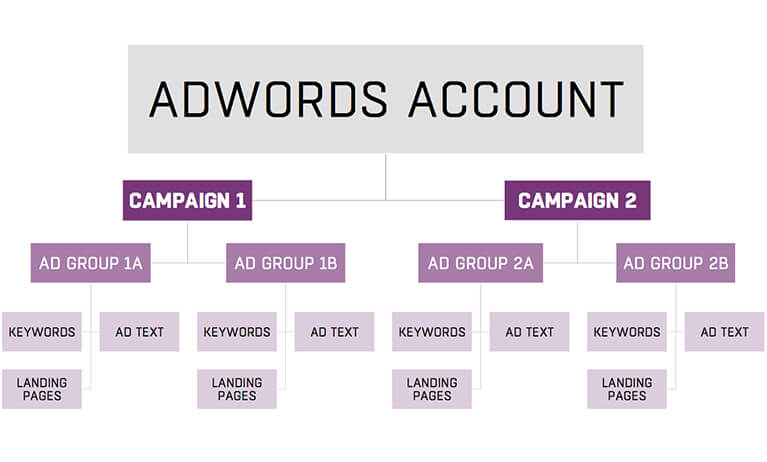
The following are the basic elements of your paid search setup:
- Campaigns: These are top-level categories, such as your firm’s main practice areas. Budget and location targeting (among other things) are designated for each campaign.
- Ad Groups: These are subgroups of your campaigns, organized and optimized for relevance, so you match the searcher’s exact needs. Each group will trigger different ads to appear on someone’s screen, so they’re as relevant as possible.
- Keywords: Each ad group has a set of target keywords that call up specific ads and landing pages addressing those keywords. This is more involved than just thinking up some synonyms for “car wreck lawyer.” Keyword planning includes analyzing a web searcher’s intent and where they are in the process of choosing a lawyer when they see a certain ad.
- Ad Text: This is the format of the ads themselves:
- Up to three 30-character headlines
- Two 90-character description lines
- A web address, such as “smithlawfirm.com/Apply-Today”
Within that format, you can swap in unlimited combinations of different headlines and descriptions.
And Google regularly changes the specific parameters of ads, including their lengths, so at Firmidable we make sure to stay on top of all the latest changes.
Another Element You Can Add: Extensions
Aside from this basic organizational structure, you can also write “extensions” to go with your ads.
These are nuggets of additional information. Google chooses when to display extensions based on previous ad performance, the context the searcher is coming from and available space on the page.
Making data-driven adjustments to ad extensions helps increase the power and value of your campaigns.
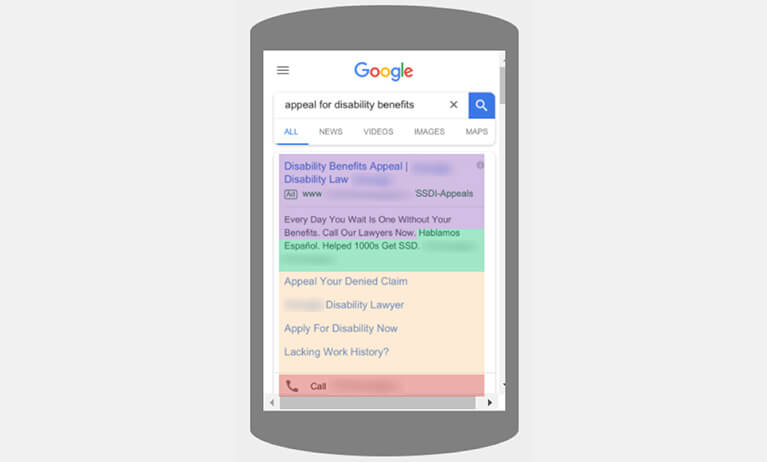
Ad extensions come in several forms:
Location Extensions: The top extension we use at our legal marketing agency is the “location” extension. We link your office address with Google Maps, increasing your visibility on maps that appear in search results, a valuable position to hold.
Callout Extensions: These let us add to the message of the ad (e.g., you can list your different practice areas or name the major towns you serve).
“If we want to get a little more detailed about the law firm,” Alex said, “we can use those callout extensions to highlight our client’s unique selling propositions, like decades of experience or ‘no fees charged unless you win.’”
Call Extensions: Call extensions remove friction. A prospective client can call you directly from the ad. With the widespread use of mobile devices, this is an increasingly powerful feature.
Sitelink Extensions: These help you claim more space in the search results by linking to popular pages on your website.
Snippet Extensions: Snippet extensions give you another chance to spotlight reasons to choose your firm.
Optimization: Getting the Most for Your Law Firm’s Paid Search Money
Setup is crucial, but we don’t want to just “set it and forget it.”
Paid search gives you the power to improve your campaign using live, up-to-the-minute data.
At Firmidable, we produce monthly reports on how the ads are performing, helping drive savvy fine-tuning.
We regularly revisit each of the following points:
- Optimizing our bids on keywords in Google to ensure that ads are showing at the right times and places. This means regularly adjusting which ads get the most budget.
- Testing different versions of ads and landing pages to see which work best.
- Updating keyword research to see what terms should be added or dropped.
- Pausing or adding keywords, ad groups or whole campaigns as we identify areas of weakness and opportunity.
- Ensuring ad extensions are up to date and showing properly.
- Ensuring the technical machinery is still working, such as forms people fill out online and submit to you.
Here are even more areas to keep in mind for optimization:
Geo-Targeting: Does your firm target your entire state? Or do you have a campaign focused on a specific city? We can define your geographic targets precisely and compare performance across different areas. Using locally relevant ad copy also increases your chance of appearing in Google’s “3-Pack,” which includes a map and links to a few select firms, displayed immediately after the paid ads.
Ad Position: You might assume you always want your ad to show up on top of all others. But sometimes paying more for the top position isn’t your smartest option.
“The top spot can go for around $400 when we’re talking about a personal injury attorney,” Alex said. “But that bottom spot (the third or fourth result down)? We may be able to get that spot for around $40.”
We know people are going to click the top spot the most. But paying $400 a pop to consistently appear at the top could burn through your budget quickly.
Consistently appearing in the second, third and fourth spots at a much lower cost may, in the end, deliver a higher return on your investment.
Landing Page Relevance: The landing page people reach after they click your ad should be spot-on relevant to what they searched. The more relevant it is, the more likely a user is to reach out to your firm. The page copy should match the ad copy (which matched the search query). As your campaign runs, double-check to be sure the ads and landing pages speak directly to your potential client’s needs.
How Do You Know What’s Working?
From the very first setup, at Firmidable we incorporate tracking systems for forms, calls and chats.
“We also go further with this and get intake tracking and revenue tracking so we can really see what the (return on investment) is for you,” Alex said. “At the end of the day it needs to make money for you, not just generate impressions and clicks.”
See Paid Search Results from Successful Law Firms
What impact can you expect from a paid search campaign?
Below are actual results from Firmidable clients around the country. These are what we consider successful campaigns after several months of maintenance and optimization.
Case Study #1: Car Accident Law Firm
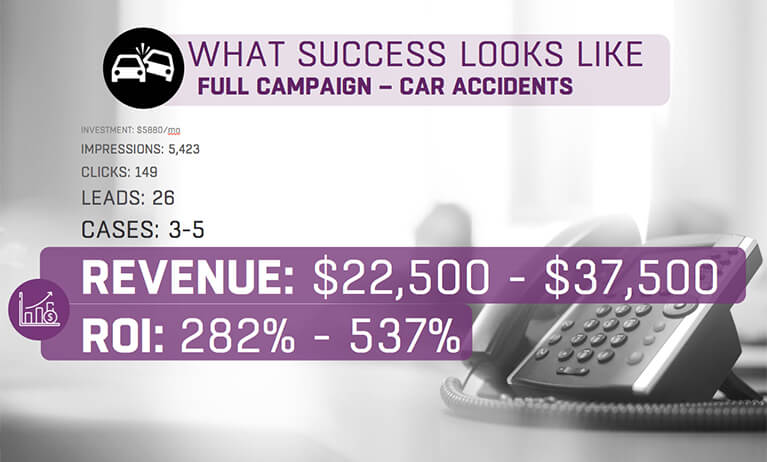
- $5,880 investment (one month)
- 5,423 impressions in search results
- 149 clicks through to the landing page or calls from the ad
- 26 prospects contacting the firm from the landing page
- 3-5 cases taken
With a typical car accident case fee of $7,500, we project revenue from this campaign to range from $22,500 (for three cases taken) to $37,500 (for five cases), giving the law firm a return on investment (ROI) between 282% and 537%. Depending on your average case fee, you can do the math to determine what your ROI would be.
Case Study #2: Social Security Disability and Long-Term Disability Law Firm
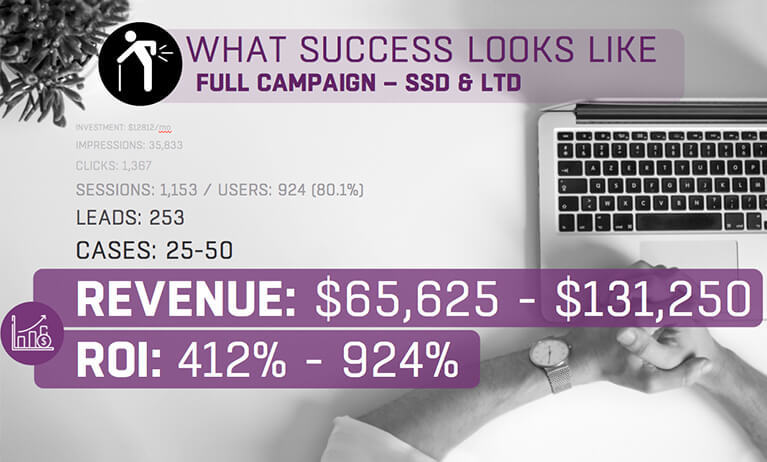
- $12,812 investment (one month)
- 35,833 impressions in search results
- 1,367 clicks to the landing page or calls from the ad
- 253 prospects contacting the firm from the landing page
- 25-50 cases taken
Using the average case fees that we see for Social Security Disability and long-term disability firms, we expect revenue from these ads to reach from $65,625 to $131,250. That’s an ROI of 412% to 924%.
Next Steps for Firms Running Successful PPC Campaigns
You’ve set everything up correctly. You’re monitoring and making adjustments. And you’re seeing great results.
What’s next?
Don’t stop optimizing! Test and monitor and stay on the frontlines of Google’s nonstop changes and updates.
“Ultimately, this is something you’re going to want to grow your firm with,” Alex said. “So I wouldn’t want to, say, test it out for a month to see what happens. You want that long-term growth mindset.”
Typically, he said, law firms need six months to truly benefit from the data they get from their campaigns. After that, continued diligent monitoring will squeeze the most value from your ad spending.
Other steps you can take to boost the impact of your advertising include adding live chat and call center services for fielding prospects who contact you. With those systems, you increase your advertising effectiveness by engaging prospects even when your office is closed.
Another long-term goal would be to spread your success to other search engines. This guide focused on Google Ads, but many of the principles also apply when you launch campaigns on other online platforms, including Bing, Facebook and YouTube.
“We typically want to optimize Google first,” Alex said. Google undeniably has the largest share of the target market for law firms.
“But if someone came to me and asked what an optimal campaign looks like in their market, I would include Bing in my proposal. We want to include that 20 or 25% share of the market that we would miss out on if we were only relying on Google.”
Whether you’re considering paid search as a standalone tactic or part of your law firm’s overall marketing strategy, the legal marketing experts at Firmidable can help you find the most direct route to new clients.
After prospects respond to your paid search ads, we can even help you clinch them as clients with a better intake process.
Firmidable is the nation’s best legal marketing agency. We know more than anyone about how Americans choose their lawyers.
